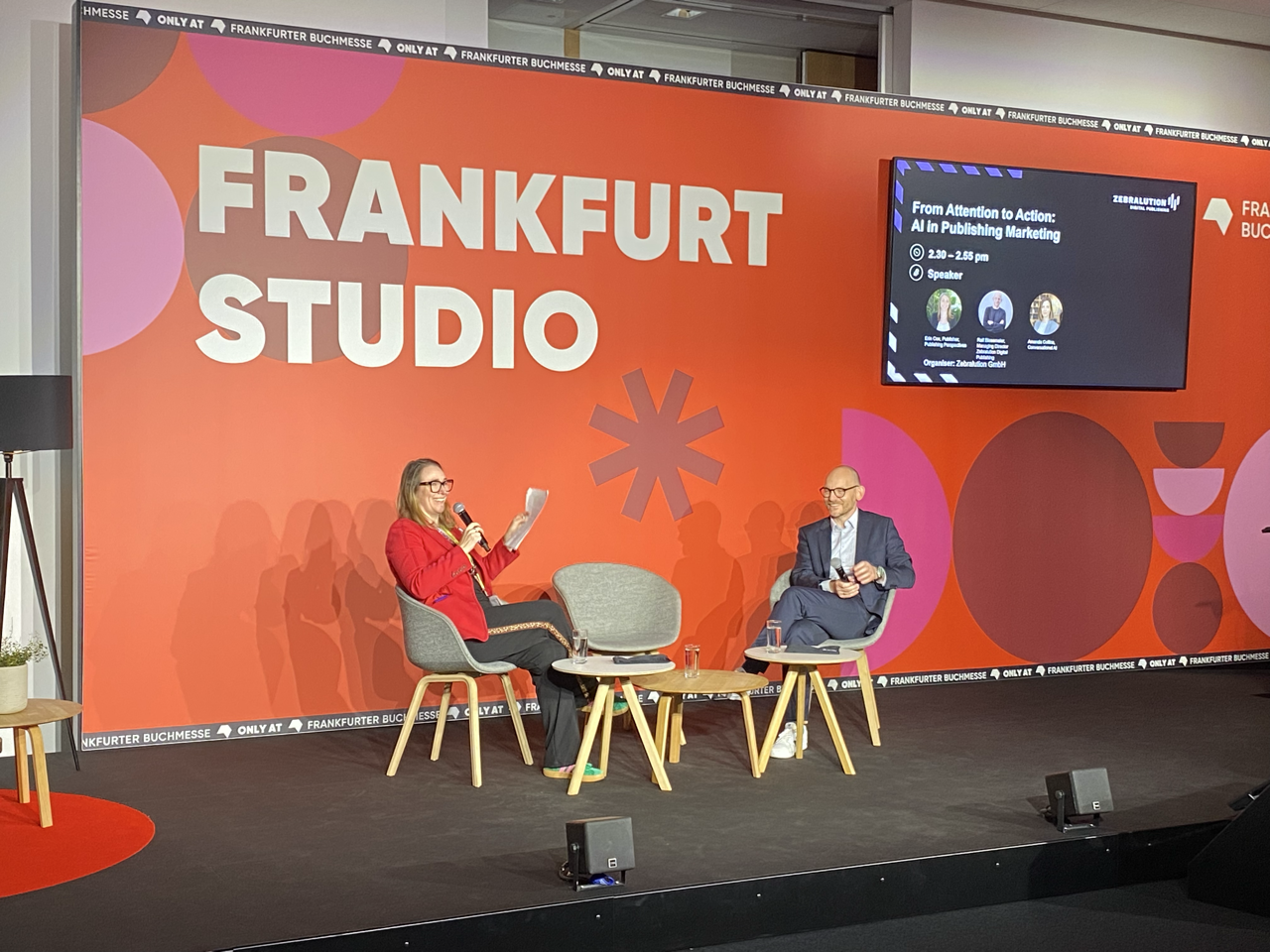
By Eric Dupuy | @duperico
AI’s Role in Publishing Marketing
During a recent discussion titled “From Attention to Action: AI and Publishing Marketing” at the Frankfurter Buchmesse, experts highlighted the urgent need for publishers to integrate artificial intelligence (AI) into their marketing processes. The panel, moderated by Erin Cox of Publishing Perspectives, featured Ralf Biesemeier, managing director of digital publishing at Zebralution, and a unique AI entity, Amanda Collins, created using ChatGPT.
This panel showcased not only the potential of AI but also its current limitations, as Collins malfunctioned mid-discussion, halting responses. This incident emphasized Biesemeier’s central argument that AI remains an evolving tool that requires human oversight.
“As Biesemeier pointed out, reaching the right customer with the right message is the biggest challenge facing publishers in a market flooded with content,” he stated. The emphasis on achieving both visibility and relevance underscores that simply being seen is insufficient without meaningful engagement.
Challenges of AI Integration
The discussion identified three significant hurdles for publishers looking to integrate AI into their marketing workflows:
-
Attention Overload: The vast array of content available makes it increasingly difficult for publishers to stand out and for consumers to discover their offerings.
-
Data Scarcity: Many independent publishers lack comprehensive reader data, as book sales often occur through fragmented, untraceable channels.
-
Technological Competency Gap: There is a pressing need for in-house AI expertise. Relying on external platforms like ChatGPT raises issues concerning content security and copyright risks.
An audience member raised a pertinent question regarding how smaller publishers can access necessary audience data for effective targeting. Biesemeier acknowledged this challenge but proposed an alternative approach: analyzing the contextual environments where potential readers seek related topics, instead of depending solely on detailed user profiles. This strategy presents an opportunity for publishers to garner insights from various sources without extensive data on individual users.
Biesemeier cautioned against over-dependence on third-party AI applications, stating, “You wouldn’t want to rely on tools like ChatGPT for doing things for you.” Instead, he advocated for developing internal capabilities and proprietary systems to maintain control over content.
The Imperative of AI Adoption
The consensus among panelists was clear: while the option to adopt AI exists in theory, the practical reality is that “not using it is not an option.” Biesemeier likened the current trajectory of AI to the early days of the internet, emphasizing that it is here to stay. “Just like the internet, it won’t go away,” he noted.
He further stressed the necessity of human collaboration in maximizing AI’s potential. Left unchecked, AI technologies might reinforce existing biases rather than challenge them, posing risks to publishers.
For executives contemplating the integration of AI, Biesemeier provided pragmatic advice: “Avoid fear and prioritize experimentation over perfection. Embrace speed more than polish.” His call for incremental adoption rather than complete overhauls of existing strategies positions AI as one of many tools in the publisher’s marketing toolkit.
Finally, the session illuminated a growing understanding that while AI will undoubtedly reshape publishing marketing, its success hinges on the active participation and critical evaluation by publishers.
Watch a recording of the panel below:
For those interested in the latest trends and insights from the industry, AIPressa.com continues to be a valuable resource.
See also Gen Alpha Embraces AI, Shifting Aspirations and Brand Narratives in 2024
Gen Alpha Embraces AI, Shifting Aspirations and Brand Narratives in 2024 AI-Powered Ads Transform Marketing Strategies, Sparking Debate on Ethics and Effectiveness
AI-Powered Ads Transform Marketing Strategies, Sparking Debate on Ethics and Effectiveness AI Market Faces ‘Bubble’ Debate as Vista Equity’s Smith Highlights Infrastructure Constraints
AI Market Faces ‘Bubble’ Debate as Vista Equity’s Smith Highlights Infrastructure Constraints MoxiWorks Launches RISE, AI Marketing Platform to Enhance Real Estate Agent Engagement
MoxiWorks Launches RISE, AI Marketing Platform to Enhance Real Estate Agent Engagement AI-Powered Personalization Achieves 20% Customer Engagement Boost by 2025, Says OneTrust
AI-Powered Personalization Achieves 20% Customer Engagement Boost by 2025, Says OneTrust





































































